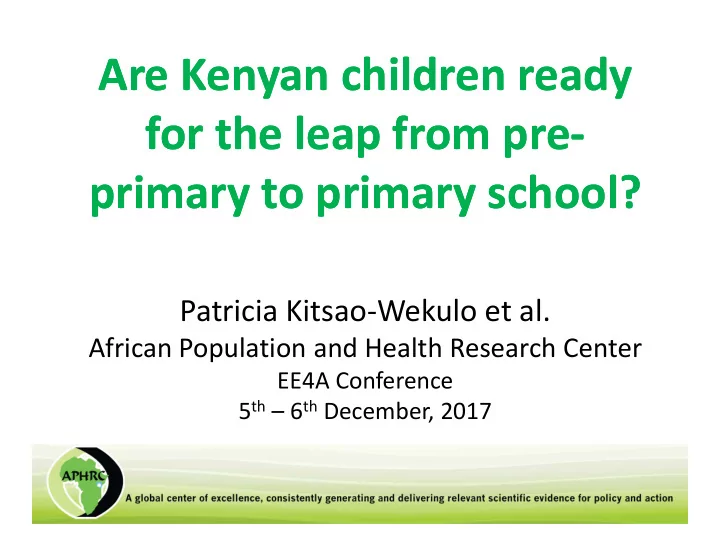

Are Kenyan children ready Are Kenyan children ready for the leap from pre ‐ for the leap from pre ‐ primary to primary school? primary to primary school? Patricia Kitsao ‐ Wekulo et al. African Population and Health Research Center EE4A Conference 5 th – 6 th December, 2017
Background • Many children in Kenya do not receive quality ECDE services • Less likely to be ready for primary school • And yet quality ECDE predicts future outcomes
Objectives Identify individual and school background factors associated with learners’ school readiness
Purpose of the Tayari Programme Develop a tested , cost-effective , affordable and scalable model of ECDE
1st Treatment Package (T1) DICECE training Improved The Tayari Model The Tayari Model Teacher support outcomes in: Literacy 2nd Treatment Package (T2) Pre-primary Numeracy DICECE training school Executive functioning children in Teacher support Psychosocial Kenya ready Books & Teachers’ guides to join Standard 1 3rd Treatment Package (T3) DICECE training Improved Teacher support outcomes in health Books & Teachers’ guides Health support ACTIVITY OUTCOME IMPACT
Methods • Randomized control trial (RCT) – Three treatment arms, one control arm • “Stepped ‐ wedge” design – Half sample in 2016, full sample in 2017
Methods • Baseline data from cross ‐ sectional sample of learners • 151 public and 147 APBET schools • Data collection – direct assessment, survey instruments, classroom observation tool • Outcome measure – TSRI
Computation of TSRI 1. Direct assessment items grouped into 10 subtasks (69 items) • Executive function –6 items • Rhyme –7 } • Letter naming –20 } • Letter sound knowledge –10 } Literacy • Initial sound discrimination –10 } • Listening comprehension –4 } • S hape naming –3 } • Quantity discrimination –3 } Numeracy • Addition and subtraction –3 } • Measurement vocabulary –3 }
Computation of TSRI 2 . Learner percentage subtask score x weighting factor of 0.1 = 10 weighted scores 3. Sum of 10 weighted scores = Tayari School Readiness Index (max possible is 100%)
Results
TSRI scores S chool readiness generally low
Gender differences No significant gender differences
Teachers’ professional training Teachers’ level of professional training matters
Implications • Need to improve quality of ECDE services • Need to invest more funds in ECDE sector • Need to make sector more attractive to professionally ‐ trained teachers
Acknowledgements CIFF R TI International MoE R esearch participants R esearch team
Recommend
More recommend